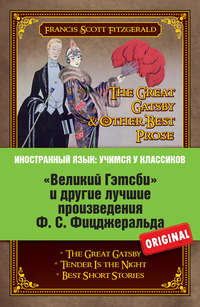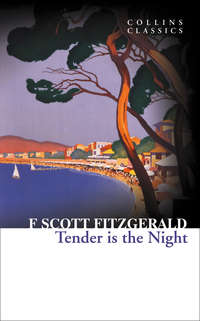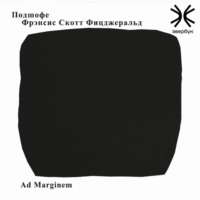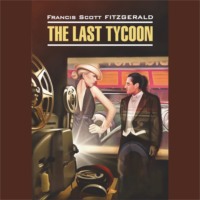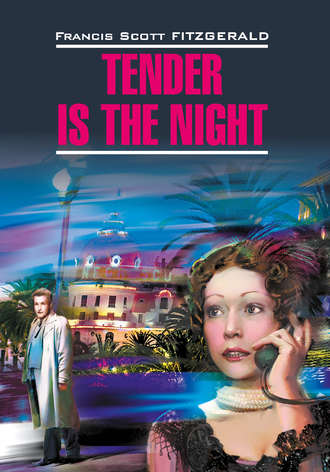
Полная версия
Tender is the night / Ночь нежна. Книга для чтения на английском языке
As she stood in the fuzzy green light of the vegetable garden, Dick crossed the path ahead of her going to his work house. Nicole waited silently till he had passed; then she went on through lines of prospective salads to a little menagerie where pigeons and rabbits and a parrot made a medley of insolent noises at her. Descending to another ledge she reached a low, curved wall and looked down seven hundred feet to the Mediterranean Sea.
She stood in the ancient hill village of Tarmes. The villa and its grounds were made out of a row of peasant dwellings that abutted on the cliff – five small houses had been combined to make the house and four destroyed to make the garden. The exterior walls were untouched so that from the road far below it was indistinguishable from the violet gray mass of the town.
For a moment Nicole stood looking down at the Mediterranean but there was nothing to do with that, even with her tireless hands. Presently Dick came out of his one-room house carrying a telescope and looked east toward Cannes. In a moment Nicole swam into his field of vision, whereupon he disappeared into his house and came out with a megaphone. He had many light mechanical devices.
“Nicole,” he shouted, “I forgot to tell you that as a final apostolic gesture I invited Mrs. Abrams, the woman with the white hair.”
“I suspected it. It’s an outrage.”
The ease with which her reply reached him seemed to belittle his megaphone, so she raised her voice and called, “Can you hear me?”
“Yes.” He lowered the megaphone and then raised it stubbornly. “I’m going to invite some more people too. I’m going to invite the two young men.”
“All right,” she agreed placidly.
“I want to give a really bad party. I mean it. I want to give a party where there’s a brawl and seductions and people going home with their feelings hurt and women passed out[56] in the cabinet de toilette[57]. You wait and see.”
He went back into his house and Nicole saw that one of his most characteristic moods was upon him, the excitement that swept everyone up into it and was inevitably followed by his own form of melancholy, which he never displayed but at which she guessed. This excitement about things reached an intensity out of proportion to their importance, generating a really extraordinary virtuosity with people. Save among a few of the toughminded and perennially suspicious, he had the power of arousing a fascinated and uncritical love. The reaction came when he realized the waste and extravagance involved. He sometimes looked back with awe at the carnivals of affection he had given, as a general might gaze upon a massacre he had ordered to satisfy an impersonal blood lust.
But to be included in Dick Diver’s world for a while was a remarkable experience: people believed he made special reservations about them, recognizing the proud uniqueness of their destinies, buried under the compromises of how many years. He won everyone quickly with an exquisite consideration and a politeness that moved so fast and intuitively that it could be examined only in its effect. Then, without caution, lest the first bloom of the relation wither, he opened the gate to his amusing world. So long as they subscribed to it completely, their happiness was his preoccupation, but at the first flicker of doubt as to its all-inclusiveness he evaporated before their eyes, leaving little communicable memory of what he had said or done.
At eight-thirty that evening he came out to meet his first guests, his coat carried rather ceremoniously, rather promisingly, in his hand, like a toreador’s cape. It was characteristic that after greeting Rosemary and her mother he waited for them to speak first, as if to allow them the reassurance of their own voices in new surroundings.
To resume Rosemary’s point of view it should be said that, under the spell of the climb to Tarmes and the fresher air, she and her mother looked about appreciatively. Just as the personal qualities of extraordinary people can make themselves plain in an unaccustomed change of expression, so the intensely calculated perfection of Villa Diana transpired all at once through such minute failures as the chance apparition of a maid in the background or the perversity of a cork. While the first guests arrived bringing with them the excitement of the night, the domestic activity of the day receded past them gently, symbolized by the Diver children and their governess still at supper on the terrace.
“What a beautiful garden!” Mrs. Speers exclaimed.
“Nicole’s garden,” said Dick. “She won’t let it alone – she nags it all the time, worries about its diseases. Any day now I expect to have her come down with Powdery Mildew or Fly Speck, or Late Blight[58].” He pointed his forefinger decisively at Rosemary, saying with a lightness seeming to conceal a paternal interest, “I’m going to save your reason – I’m going to give you a hat to wear on the beach.”
He turned them from the garden to the terrace, where he poured a cocktail. Earl Brady arrived, discovering Rosemary with surprise. His manner was softer than at the studio, as if his differentness had been put on at the gate, and Rosemary, comparing him instantly with Dick Diver, swung sharply toward the latter. In comparison Earl Brady seemed faintly gross, faintly ill-bred; once more, though, she felt an electric response to his person.
He spoke familiarly to the children who were getting up from their outdoor supper.
“Hello, Lanier, how about a song? Will you and Topsy sing me a song?”
“What shall we sing?” agreed the little boy, with the odd chanting accent of American children brought up in France.
“That song about ’Mon ami Pierrot’[59].”
Brother and sister stood side by side without self-consciousness and their voices soared sweet and shrill upon the evening air.
Au clair de la luneMon Ami PierrotPrête-moi ta plumePour écrire un motMa chandelle est morteJe n’ai plus de feuOuvre-moi ta portePour Vamour de Dieu.[60]The singing ceased and the children, their faces aglow with the late sunshine, stood smiling calmly at their success. Rosemary was thinking that the Villa Diana was the centre of the world. On such a stage some memorable thing was sure to happen. She lighted up higher as the gate tinkled open and the rest of the guests arrived in a body – the McKiscos, Mrs. Abrams, Mr. Dumphry, and Mr. Campion came up to the terrace.
Rosemary had a sharp feeling of disappointment – she looked quickly at Dick, as though to ask an explanation of this incongruous mingling. But there was nothing unusual in his expression. He greeted his new guests with a proud bearing and an obvious deference to their infinite and unknown possibilities. She believed in him so much that presently she accepted the rightness of the McKiscos’ presence as if she had expected to meet them all along.
“I’ve met you in Paris,” McKisco said to Abe North, who with his wife had arrived on their heels[61], “in fact I’ve met you twice.”
“Yes, I remember,” Abe said.
“Then where was it?” demanded McKisco, not content to let well enough alone.
“Why, I think —” Abe got tired of the game, “I can’t remember.”
The interchange filled a pause and Rosemary’s instinct was that something tactful should be said by somebody, but Dick made no attempt to break up the grouping formed by these late arrivals, not even to disarm Mrs. McKisco of her air of supercilious amusement. He did not solve this social problem because he knew it was not of importance at the moment and would solve itself. He was saving his newness for a larger effort, waiting a more significant moment for his guests to be conscious of a good time.
Rosemary stood beside Tommy Barban – he was in a particularly scornful mood and there seemed to be some special stimulus working upon him. He was leaving in the morning.
“Going home?”
“Home? I have no home. I am going to a war.” “What war?”
“What war? Any war. I haven’t seen a paper lately but I suppose there’s a war – there always is.”
“Don’t you care what you fight for?”
“Not at all – so long as I’m well treated. When I’m in a rut[62] I come to see the Divers, because then I know that in a few weeks I’ll want to go to war.”
Rosemary stiffened.
“You like the Divers,” she reminded him.
“Of course – especially her – but they make me want to go to war.”
She considered this, to no avail[63]. The Divers made her want to stay near them forever.
“You’re half American,” she said, as if that should solve the problem.
“Also I’m half French, and I was educated in England and since I was eighteen I’ve worn the uniforms of eight countries. But I hope I did not give you the impression that I am not fond of the Divers – I am, especially of Nicole.”
“How could any one help it?” she said simply.
She felt far from him. The undertone of his words repelled her and she withdrew her adoration for the Divers from the profanity of his bitterness. She was glad he was not next to her at dinner and she was still thinking of his words “especially her” as they moved toward the table in the garden.
For a moment now she was beside Dick Diver on the path. Alongside his hard, neat brightness everything faded into the surety that he knew everything. For a year, which was forever, she had had money and a certain celebrity and contact with the celebrated, and these latter had presented themselves merely as powerful enlargements of the people with whom the doctor’s widow and her daughter had associated in a hotel-pension in Paris. Rosemary was a romantic and her career had not provided many satisfactory opportunities on that score. Her mother, with the idea of a career for Rosemary, would not tolerate any such spurious substitutes as the excitations available on all sides, and indeed Rosemary was already beyond that – she was In the movies but not at all At them. So when she had seen approval of Dick Diver in her mother’s face it meant that he was “the real thing”; it meant permission to go as far as she could.
“I was watching you,” he said, and she knew he meant it. “We’ve grown very fond of you.”
“I fell in love with you the first time I saw you,” she said quietly.
He pretended not to have heard, as if the compliment were purely formal.
“New friends,” he said, as if it were an important point, “can often have a better time together than old friends.”
With that remark, which she did not understand precisely, she found herself at the table, picked out by slowly emerging lights against the dark dusk. A chord of delight struck inside her when she saw that Dick had taken her mother on his right hand[64]; for herself she was between Luis Campion and Brady.
Surcharged with her emotion she turned to Brady with the intention of confiding in him, but at her first mention of Dick a hard-boiled sparkle in his eyes gave her to understand that he refused the fatherly office. In turn she was equally firm when he tried to monopolize her hand, so they talked shop[65] or rather she listened while he talked shop, her polite eyes never leaving his face, but her mind was so definitely elsewhere that she felt he must guess the fact. Intermittently she caught the gist of his sentences and supplied the rest from her subconscious, as one picks up the striking of a clock in the middle with only the rhythm of the first uncounted strokes lingering in the mind.
VII
In a pause Rosemary looked away and up the table where Nicole sat between Tommy Barban and Abe North, her chow’s hair foaming and frothing in the candlelight. Rosemary listened, caught sharply by the rich clipped voice in infrequent speech:
“The poor man,” Nicole exclaimed. “Why did you want to saw him in two?”
“Naturally I wanted to see what was inside a waiter. Wouldn’t you like to know what was inside a waiter?”
“Old menus,” suggested Nicole with a short laugh. “Pieces of broken china and tips and pencil stubs.”
“Exactly – but the thing was to prove it scientifically. And of course doing it with that musical saw would have eliminated any sordidness.”
“Did you intend to play the saw while you performed the operation?” Tommy inquired.
“We didn’t get quite that far. We were alarmed by the screams. We thought he might rupture something.”
“All sounds very peculiar to me,” said Nicole. “Any musician that’ll use another musician’s saw to —”
They had been at table half an hour and a perceptible change had set in – person by person had given up something, a preoccupation, an anxiety, a suspicion, and now they were only their best selves and the Divers’ guests. Not to have been friendly and interested would have seemed to reflect on the Divers, so now they were all trying, and seeing this, Rosemary liked everyone – except McKisco, who had contrived to be the unassimilated member of the party. This was less from ill will than from his determination to sustain with wine the good spirits he had enjoyed on his arrival. Lying back in his place between Earl Brady, to whom he had addressed several withering remarks about the movies, and Mrs. Abrams, to whom he said nothing, he stared at Dick Diver with an expression of devastating irony, the effect being occasionally interrupted by his attempts to engage Dick in a cater-cornered[66] conversation across the table.
“Aren’t you a friend of Van Buren Denby?” he would say.
“I don’t believe I know him.”
“I thought you were a friend of his,” he persisted irritably.
When the subject of Mr. Denby fell of its own weight, he essayed other equally irrelative themes, but each time the very deference of Dick’s attention seemed to paralyze him, and after a moment’s stark pause the conversation that he had interrupted would go on without him. He tried breaking into other dialogues, but it was like continually shaking hands with a glove from which the hand had been withdrawn – so finally, with a resigned air of being among children, he devoted his attention entirely to the champagne.
Rosemary’s glance moved at intervals around the table, eager for the others’ enjoyment, as if they were her future stepchildren. A gracious table light, emanating from a bowl of spicy pinks, fell upon Mrs. Abrams’ face, cooked to a turn in Veuve Cliquot[67], full of vigor, tolerance, adolescent good will; next to her sat Mr. Royal Dumphry, his girl’s comeliness less startling in the pleasure world of evening. Then Violet McKisco, whose prettiness had been piped to the surface of her, so that she ceased her struggle to make tangible to herself her shadowy position as the wife of an arriviste who had not arrived.
Then came Dick, with his arms full of the slack he had taken up from others, deeply merged in his own party.
Then her mother, forever perfect.
Then Barban talking to her mother with an urbane fluency that made Rosemary like him again. Then Nicole. Rosemary saw her suddenly in a new way and found her one of the most beautiful people she had ever known. Her face, the face of a saint, a viking[68] Madonna, shone through the faint motes that snowed across the candlelight, drew down its flush from the wine-colored lanterns in the pine. She was still as still.
Abe North was talking to her about his moral code: “Of course I’ve got one,” he insisted, “ – a man can’t live without a moral code. Mine is that I’m against the burning of witches. Whenever they burn a witch I get all hot under the collar.” Rosemary knew from Brady that he was a musician who after a brilliant and precocious start had composed nothing for seven years.
Next was Campion, managing somehow to restrain his most blatant effeminacy, and even to visit upon those near him a certain disinterested motherliness. Then Mary North with a face so merry that it was impossible not to smile back into the white mirrors of her teeth – the whole area around her parted lips was a lovely little circle of delight.
Finally Brady, whose heartiness became, moment by moment, a social thing instead of a crude assertion and reassertion of his own mental health, and his preservation of it by a detachment from the frailties of others.
Rosemary, as dewy with belief as a child from one of Mrs. Burnett’s[69] vicious tracts, had a conviction of homecoming, of a return from the derisive and salacious improvisations of the frontier. There were fireflies riding on the dark air and a dog baying on some low and far-away ledge of the cliff. The table seemed to have risen a little toward the sky like a mechanical dancing platform, giving the people around it a sense of being alone with each other in the dark universe, nourished by its only food, warmed by its only lights. And, as if a curious hushed laugh from Mrs. McKisco were a signal that such a detachment from the world had been attained, the two Divers began suddenly to warm and glow and expand, as if to make up to their guests, already so subtly assured of their importance, so flattered with politeness, for anything they might still miss from that country well left behind. Just for a moment they seemed to speak to everyone at the table, singly and together, assuring them of their friendliness, their affection. And for a moment the faces turned up toward them were like the faces of poor children at a Christmas tree. Then abruptly the table broke up – the moment when the guests had been daringly lifted above conviviality into the rarer atmosphere of sentiment, was over before it could be irreverently breathed, before they had half realized it was there.
But the diffused magic of the hot sweet South had withdrawn into them – the soft-pawed night and the ghostly wash of the Mediterranean far below – the magic left these things and melted into the two Divers and became part of them. Rosemary watched Nicole pressing upon her mother a yellow evening bag she had admired, saying, “I think things ought to belong to the people that like them” – and then sweeping into it all the yellow articles she could find, a pencil, a lipstick, a little note book, “because they all go together.”
Nicole disappeared and presently Rosemary noticed that Dick was no longer there; the guests distributed themselves in the garden or drifted in toward the terrace.
“Do you want,” Violet McKisco asked Rosemary, “to go to the bathroom?”
Not at that precise moment.
“I want,” insisted Mrs. McKisco, “to go to the bathroom.” As a frank outspoken woman she walked toward the house, dragging her secret after her, while Rosemary looked after with reprobation. Earl Brady proposed that they walk down to the sea wall but she felt that this was her time to have a share of Dick Diver when he reappeared, so she stalled, listening to McKisco quarrel with Barban.
“Why do you want to fight the Soviets?” McKisco said. “The greatest experiment ever made by humanity? And the Riff?[70] It seems to me it would be more heroic to fight on the just side.”
“How do you find out which it is?” asked Bar-ban dryly.
“Why – usually everybody intelligent knows.”
“Are you a Communist?”
“I’m a Socialist,” said McKisco, “I sympathize with Russia.”
“Well, I’m a soldier,” Barban answered pleasantly. “My business is to kill people. I fought against the Riff because I am a European, and I have fought the Communists because they want to take my property from me.”
“Of all the narrow-minded excuses,” McKisco looked around to establish a derisive liaison with someone else, but without success. He had no idea what he was up against in Barban, neither of the simplicity of the other man’s bag of ideas nor of the complexity of his training. McKisco knew what ideas were, and as his mind grew he was able to recognize and sort an increasing number of them – but faced by a man whom he considered “dumb”, one in whom he found no ideas he could recognize as such, and yet to whom he could not feel personally superior, he jumped at the conclusion that Barban was the end product of an archaic world, and as such, worthless. McKisco’s contacts with the princely classes in America had impressed upon him their uncertain and fumbling snobbery, their delight in ignorance and their deliberate rudeness, all lifted from the English with no regard paid to factors that make English philistinism and rudeness purposeful, and applied in a land where a little knowledge and civility buy more than they do anywhere else – an attitude which reached its apogee in the “Harvard manner” of about 1900. He thought that this Barban was of that type, and being drunk rashly forgot that he was in awe of him – this led up to the trouble in which he presently found himself.
Feeling vaguely ashamed for McKisco, Rosemary waited, placid but inwardly on fire, for Dick Diver’s return. From her chair at the deserted table with Barban, McKisco, and Abe she looked up along the path edged with shadowy myrtle and fern to the stone terrace, and falling in love with her mother’s profile against a lighted door, was about to go there when Mrs. McKisco came hurrying down from the house.
She exuded excitement. In the very silence with which she pulled out a chair and sat down, her eyes staring, her mouth working a little, they all recognized a person crop-full of news, and her husband’s “What’s the matter, Vi?” came naturally, as all eyes turned toward her.
“My dear —” she said at large, and then addressed Rosemary, “my dear – it’s nothing. I really can’t say a word.”’
“You’re among friends,” said Abe.
“Well, upstairs I came upon a scene, my dears—”
Shaking her head cryptically she broke off just in time, for Tommy arose and addressed her politely but sharply:
“It”s inadvisable to comment on what goes on in this house”
VIII
Violet breathed loud and hard once and with an effort brought another expression into her face.
Dick came finally and with a sure instinct he separated Barban and the McKiscos and became excessively ignorant and inquisitive about literature with McKisco – thus giving the latter the moment of superiority which he required. The others helped him carry lamps up – who would not be pleased at carrying lamps helpfully through the darkness? Rosemary helped, meanwhile responding patiently to Royal Dumphry’s inexhaustible curiosity about Hollywood.
Now – she was thinking – I’ve earned a time alone with him. He must know that because his laws are like the laws Mother taught me.
Rosemary was right – presently he detached her from the company on the terrace, and they were alone together, borne away from the house toward the seaside wall with what were less steps than irregularly spaced intervals through some of which she was pulled, through others blown.
They looked out over the Mediterranean. Far below, the last excursion boat from the Isles des Lerins floated across the bay like a Fourth-of-July balloon[71] foot-loose in the heavens. Between the black isles it floated, softly parting the dark tide.
“I understand why you speak as you do of your mother,” he said. “Her attitude toward you is very fine, I think. She has a sort of wisdom that’s rare in America.”
“Mother is perfect,” she prayed.
“I was talking to her about a plan I have – she told me that how long you both stayed in France depended on you.”
On you, Rosemary all but said aloud[72].
“So since things are over down here —”
“Over?” she inquired.
“Well, this is over – this part of the summer is over. Last week Nicole’s sister left, to-morrow Tommy Barban leaves, Monday Abe and Mary North are leaving. Maybe we’ll have more fun this summer but this particular fun is over. I want it to die violently instead of fading out sentimentally – that’s why I gave this party. What I’m coming to is – Nicole and I are going up to Paris to see Abe North off for America – I wonder if you’d like to go with us.”
“What did Mother say?”
“She seemed to think it would be fine. She doesn’t want to go herself. She wants you to go alone.”
“I haven’t seen Paris since I’ve been grown,” said Rosemary. “I’d love to see it with you.”
“That’s nice of you.” Did she imagine that his voice was suddenly metallic? “Of course we’ve been excited about you from the moment you came on the beach. That vitality, we were sure it was professional – especially Nicole was. It’d never use itself up on anyone person or group.”
Her instinct cried out to her that he was passing her along slowly toward Nicole and she put her own brakes on, saying with an equal harness:
“I wanted to know all of you too – especially you. I told you I fell in love with you the first time I saw you.”







